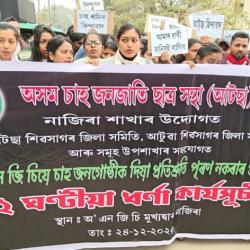The government is planning an organic revolution for the country, and the ICAR-National Bureau of Soil Survey and Land Use Planning (NBSS&LUP) has come to its aid by identifying areas holding high potential for the same.
After completing scientific research that started in 2011, the bureau along with ICAR-Indian Institute of Soil Science, Bhopal, and Food and Agricultural Organisation (FAO) has prepared a geo-spatial digital map showing organic carbon stock in the soils of all states.
Apart from Sikkim, which became India's first fully organic state last year, almost the entire North-Eastern India, including Assam, Meghalaya, Nagaland, Manipur, Arunachal Pradesh, Tripura, Mizoram and Manipur are perfectly fit for organic farming, the study of NBSS&LUP reveals.
During the research, two lakh soil samples from all over the country were collected and analysed for determining the content of organic carbon. Organic farming will give best results in areas having high quantity of organic carbon, which is a rich source of nutrients. In conventional farming, urea, nitrogen, phosphorous, insecticides and pesticides are used. But in organic farming, only natural manure is used and thus soils with adequate nutrients as evidenced by high organic carbon content are likely to produce high yield, informs ICAR-NBSS&LUP.
The map shows that parts of Kerala, Karnataka, Goa and Maharashtra, also falling under the Western Ghats, possess rich organic carbon and are ideal for organic farming. In northern India, Himachal Pradesh, Chandigarh, Uttarakhand and parts of Jammu and Kashmir are the best zones to support organic farming. On the other hand, states like Punjab, Haryana, Uttar Pradesh and West Bengal have low potential for organic farming due to "intensive cultivation". In case of intensive farming, nutrients are mined from soils without adequate replenishment. This results in the depletion of organic carbon.
Though Odisha, Chhattisgarh, Madhya Pradesh and Maharashtra's black soil hold potential for organic farming, this type of agriculture should not deplete organic carbon. Regions having good source of organic carbon will face erosion threat when the soil is exposed to intensive agriculture. To ensure that the condition of these states does not become similar to Rajasthan, which has very low organic carbon, proper soil and water conservation plan should be implemented.
The research also aims at developing strategies for sustainable agriculture to combat climate change. When carbon is depleted from the soil, it goes into the atmosphere in the form of carbon-dioxide. This leads to a significant increase in the ambient temperature, and to avoid this, proper land use planning is needed. Strategies to enhance carbon sequestration should be developed.
ICAR-NBSS&LUP plans to publish the data and share it with the Prime Minister's Office, Planning Commission, and other concerned departments. The Institute are talking about it at various platforms, and highlighting how it could be best used in promoting knowledge-based agriculture.
- 8563 reads










Add new comment